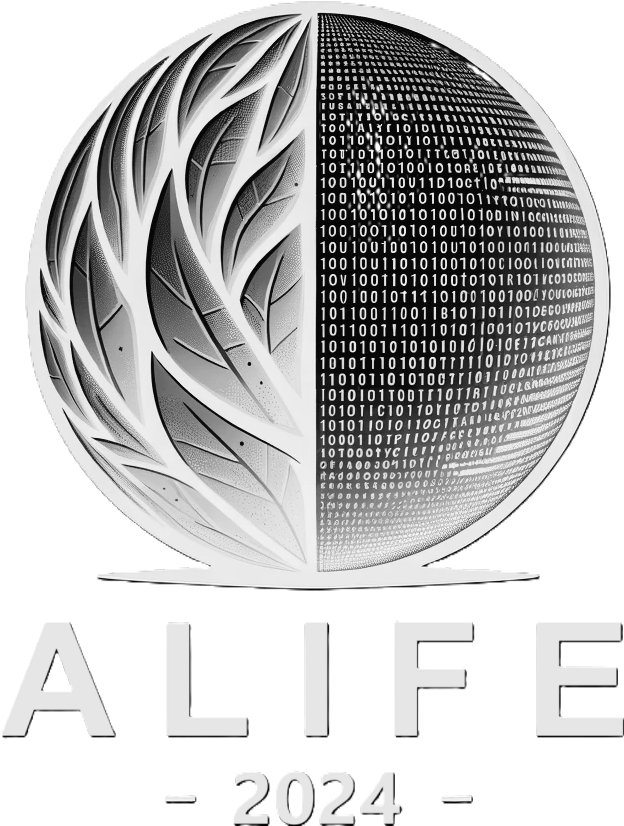The Distributed Viking: Cellular Automata, Distributed Dynamical Systems, and Their Applications to Intelligence
Special session website: link
Distributed dynamical systems such as Cellular Automata and Random Boolean Networks (and everything in between), have long been used as models to understand computation and self-replication in biology, morphogenesis, gene regulation, life-as-it-could-be, and the universe.
Such complex systems models have been extensively studied mathematically and experimentally in all their different variations, such as synchronous and asynchronous updates, dynamic automata networks that can grow and change their structure including components and interconnection topology, as well as their robustness.
Recent advances of such models, including continuous CA such as Lenia [1] and neural-based CA [2], have been proposed as substrates to study the emergence of a more general intelligence [3, 4], thanks to their propensity to support properties such as self-organization, emergence, and open-endedness.
- What can we learn from Cellular Automata and Distributed Dynamical System models about intelligence?
- How can Cellular Automata and Distributed Dynamical System models be used to study the emergence of intelligence?
This special session aims at bridging the gap between the ALife community working with CA and distributed dynamical systems, and the broader AI community interested in exploring concepts from complex systems/self-organization/artificial life for AI research and machine learning, including modular robotics such as voxel-based robots.
[1] Chan, B. W. C. (2019). Lenia: Biology of Artificial Life. Complex Systems, 28(3).
[2] Mordvintsev, A., Randazzo, E., Niklasson, E., & Levin, M. (2020). Growing neural cellular automata. ADistill, 5(2), e23.
[3] Hamon, G., Etcheverry, M., Chan, B. W. C., Moulin-Frier, C., & Oudeyer, P. Y. (2022). Learning sensorimotor agency in cellular automata.
[4] Gregor, K., & Besse, F. (2021). Self-organizing intelligent matter: A blueprint for an AI generating algorithm. arXiv preprint arXiv:2101.07627.
Organizers
- Stefano Nichele, (Østfold University College, Norway)
- Hiroki Sayama (Binghamton University, USA)
- Chrystopher Nehaniv (University of Waterloo, Canada)
- Eric Medvet (University of Trieste, Italy)
- Mario Pavone (University of Catania, Italy)
ALife And Society VIII
This proposal continues the tradition of the ALife And Society Special Session: now in its 8th year.
Artificial Life, with its combination of philosophical perspectives, modelling approaches, insights, methods, and technologies, has immense potential to engage with pressing societal, ecological, and planetary problems. Many of these are one-shot wicked problems, where the quality of “life” is fundamentally wrapped up in the quality of society and the environment. Addressing these problems necessitates interactionist perspectives rather than individualist approaches to “quality” that place equity, sustainability, and the reality of socio-economic-political contexts at the heart of research.
In doing this, we also cannot escape questions of ethics and power, and our special session provides a space for the ALife community to engage explicitly with these. The ALife and Society Special Session provides a home for extended and critical scholarly discussion on how our discipline could, does, and should engage with the grand societal, ecological, and planetary challenges of our time.
The goal of our Special Session is to continue providing a space for ALife-based research and perspectives - in particular those that can help enable or be a catalyst for addressing societal, ecological, and planetary problems - to be explored in a scientific and critical manner. Our Special Session will facilitate scholarly discourse on these areas, where ALife perspectives can be developed from ideas to experiments and practice, in collaborations with other disciplines and those working on the ground on these grand challenges. To this end, and following on from the success of previous years, we propose a diverse programme consisting of a combination of full papers/extended abstracts, invited speaker(s), and a scholarly panel.
Organizers
- Imran Khan (University of Gothenburg)
- Peter Lewis (Ontario Tech University)
